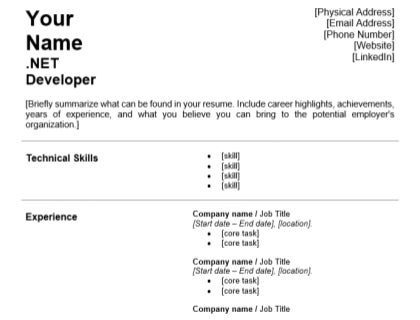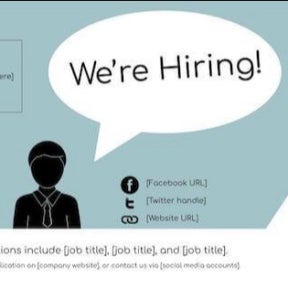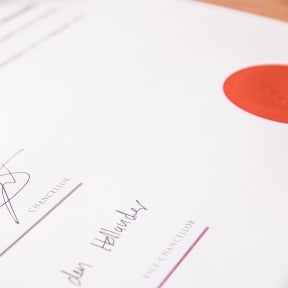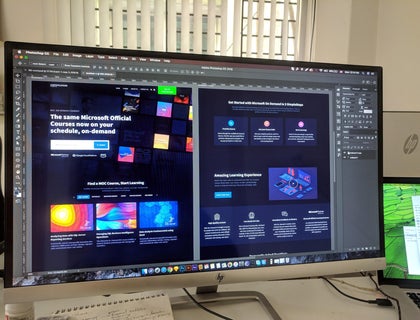
.NET Developer Resume Free Template Download
Download this .NET developer resume template in Microsoft Word format and make it your own.
Download Now.NET Developer Resume Example:
Your Name
.NET Developer
[Physical address]
[Email address]
[Phone number]
[Website]
[LinkedIn]
[Briefly summarize what can be found in your resume. Include career highlights, achievements, years of experience, core skills, and what you believe you can bring to the potential employer's organization.]
Technical Skills:
• [Skill 1]
• [Skill 2]
• [Skill 3]
• [Skill 4]
Experience:
Company name / Job Title
[Start date – End date], [location].
• [Core task 1]
• [Core task 2]
• [Core task 3]
Company name / Job Title
[Start date – End date], [location].
• [Core task 1]
• [Core task 2]
• [Core task 3]
Company name / Job Title
[Start date – End date], [location].
• [Core task 1]
• [Core task 2]
• [Core task 3]
Education:
School name / Degree
[Start date – End date], [location].
School name / Degree
[Start date – End date], [location].
Certification:
• [Certificate 1]
• [Certificate 2]
• [Certificate 3]
Notable Achievements:
• [Achievement 1]
• [Achievement 2]
• [Achievement 3]
How to Write a .Net Developer Resume:
A step-by-step guide to writing the perfect .NET developer resume.
Start with a summary.
Make your summary stand out.

You'll want your summary to create a lasting impression, intriguing employers enough to continue reading your resume. Start by highlighting your most desirable qualities including your skills, years of experience, and greatest accomplishments.
Keep your summary short and to the point.

Try to keep your summary under four sentences and only include the most pertinent information. Add a sentence about how your specific skill set and experience will benefit the employer's organization.
Highlight your technical skills.
Start with your most important skills.

Your core .NET developer skills, such as C#, F#, VB.NET, SQL, or Oracle, should be mentioned first. Be sure to mention all relevant skills that could set you apart from other candidates.
Match your skill set with the job posting.

You'll want to list all relevant skills and competencies you have acquired over time. Directly match your skills with the job requirements. Do not list skills that will not be needed for the position.
Be honest.

When listing your skills, remain honest about your level of expertise as the hiring process may require practical assessments.
List your experience.
List your work history in reverse chronological order.

The work experience section is an imperative part of your resume as employers will want to read about the computing systems and tasks you've completed at previous positions. You'll want to start this section with your most recent position.
Add the places you have worked.

Include the name of each company, your role, how long you worked there, and where the company is situated. Use bullet points to list the tasks and responsibilities for each position.
Be sure to pay special attention to the type of responsibilities you managed at previous jobs. This will help employers envision you in the role and determine the type of tasks you're knowledgeable in.
Add your education information.
List your qualifications.

In reverse chronological order, add your qualifications, each with an institution name, the dates of attendance, and a location.
Mention qualifications in progress.

If you're studying towards a qualification, indicate it at the start of this section. Omit the initial date and instead include the words "In Progress."
Include your certifications.
List any relevant certificates.

While your portfolio of projects already says a lot about you and your abilities, to help improve your chances of an interview, consider adding relevant certifications, even if not required.
Start with your most relevant certificate.

If you obtained more than one certificate, consider which one employers would be most interested in and mention it first.
Common certificates related to .NET developers include:
- Oracle Certified Professional (OCP).
- MySQL 5.6 Developer.
- Microsoft Certified Professional Developer (MCPD).
Add certification details.

Be sure to mention the institution and the date you obtained your certification. Certificates awarded by prestigious institutions indicate to employers that you have formal training and that you're passionate about your job.
List your career achievements.
Showcase any major completed projects.

Your career milestones are a great addition to your resume because they act as solid references, proving to employers that you're more than capable of exceeding their expectations.
These could include occasions you were asked to lead significant projects, such as creating an eCommerce website for a client that increased revenue by 50%, implementing a number of functions into a client's app that saw user experience improve by 20%, created a data visualization tool, etc.
List key career moments at the end of your resume.

These typically include achievements such as promotions and awards that may be of particular interest to employers.
Use bullet points to briefly describe each noteworthy event and list them in reverse chronological order. Remember that each entry should also identify the institution/employer and don't neglect to provide a date.
What Employers Look for in a .NET Developer Resume:
- Degree in web design or software engineering.
- MCSD or MCPD certification.
- Previous experience as a .NET developer.
- Knowledge of .NET infrastructure.
- Advanced proficiency in C#, F#, or VB.NET.
- Familiarity with SQL or Oracle.
- Excellent analytical, problem-solving, organizational, time management, and communication skills.


